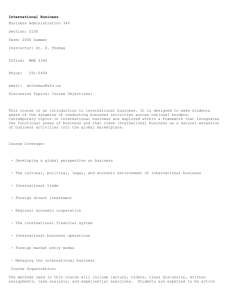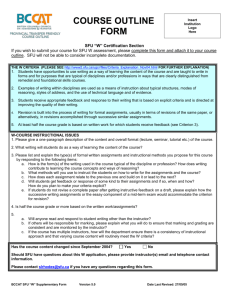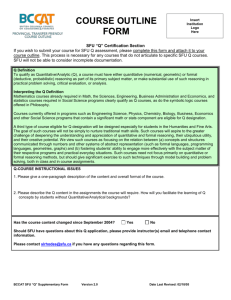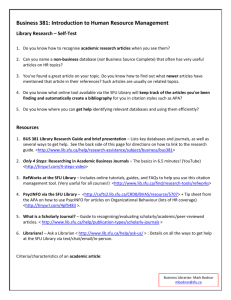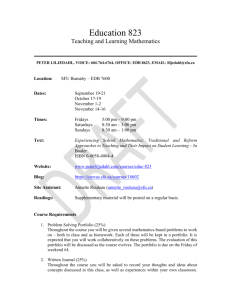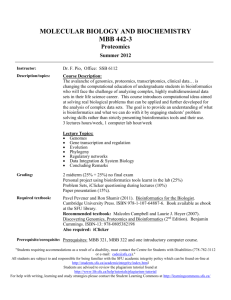Simon Fraser University - Fall 2012
advertisement
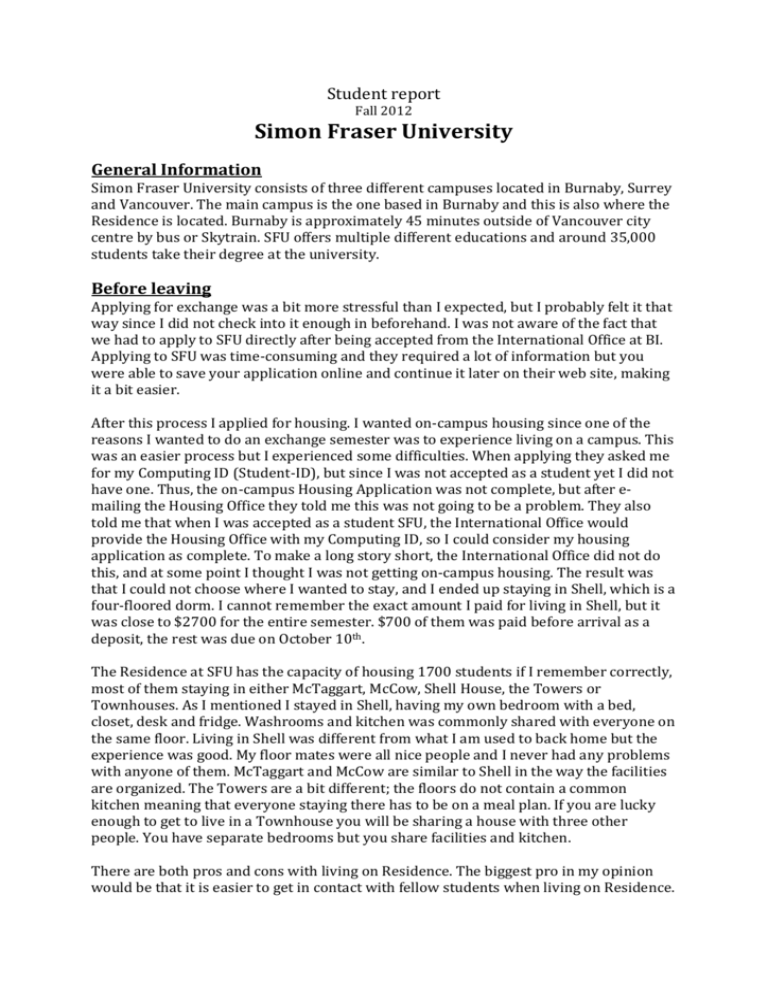
Student report Fall 2012 Simon Fraser University General Information Simon Fraser University consists of three different campuses located in Burnaby, Surrey and Vancouver. The main campus is the one based in Burnaby and this is also where the Residence is located. Burnaby is approximately 45 minutes outside of Vancouver city centre by bus or Skytrain. SFU offers multiple different educations and around 35,000 students take their degree at the university. Before leaving Applying for exchange was a bit more stressful than I expected, but I probably felt it that way since I did not check into it enough in beforehand. I was not aware of the fact that we had to apply to SFU directly after being accepted from the International Office at BI. Applying to SFU was time-consuming and they required a lot of information but you were able to save your application online and continue it later on their web site, making it a bit easier. After this process I applied for housing. I wanted on-campus housing since one of the reasons I wanted to do an exchange semester was to experience living on a campus. This was an easier process but I experienced some difficulties. When applying they asked me for my Computing ID (Student-ID), but since I was not accepted as a student yet I did not have one. Thus, the on-campus Housing Application was not complete, but after emailing the Housing Office they told me this was not going to be a problem. They also told me that when I was accepted as a student SFU, the International Office would provide the Housing Office with my Computing ID, so I could consider my housing application as complete. To make a long story short, the International Office did not do this, and at some point I thought I was not getting on-campus housing. The result was that I could not choose where I wanted to stay, and I ended up staying in Shell, which is a four-floored dorm. I cannot remember the exact amount I paid for living in Shell, but it was close to $2700 for the entire semester. $700 of them was paid before arrival as a deposit, the rest was due on October 10th. The Residence at SFU has the capacity of housing 1700 students if I remember correctly, most of them staying in either McTaggart, McCow, Shell House, the Towers or Townhouses. As I mentioned I stayed in Shell, having my own bedroom with a bed, closet, desk and fridge. Washrooms and kitchen was commonly shared with everyone on the same floor. Living in Shell was different from what I am used to back home but the experience was good. My floor mates were all nice people and I never had any problems with anyone of them. McTaggart and McCow are similar to Shell in the way the facilities are organized. The Towers are a bit different; the floors do not contain a common kitchen meaning that everyone staying there has to be on a meal plan. If you are lucky enough to get to live in a Townhouse you will be sharing a house with three other people. You have separate bedrooms but you share facilities and kitchen. There are both pros and cons with living on Residence. The biggest pro in my opinion would be that it is easier to get in contact with fellow students when living on Residence. It is also easier to get integrated with the “exchange students gang” if I can call it that. You also do not have to take the bus (which normally is pretty packed and always late) every day in order to get to campus. The downside is that you have to take the 45minute bus ride if you want to go downtown, which is sad because Vancouver is a really nice city indeed and you should try to see the most of it. I got to know a guy from Sweden who lived in the downtown area who had a sweet apartment located pretty much downtown Vancouver City and he had a blast. It is two separate experiences either living on campus or downtown. I do not want to recommend one over the other because they are both funny, it really depends on the type of experience you are looking for. Regarding transportation costs you will have to pay $140 at the beginning of the semester as a fee for the U-pass. This pass gives you unlimited access to all public transportation in Vancouver except some ferries. During my stay at SFU I was on the meal plan. This meant having access to the campus Dining Hall at any time of the day and I could eat as much food as I wanted, choosing whether I wanted to make it myself or grab whatever they served that day. I really appreciated this arrangement! I found it very convenient since I did not have to go grocery shopping and make my own food, saving me a lot of time. In the beginning of the semester I paid $1 650 for the 7-day meal plan and I recommend future students to do the same since I felt that was good value for money. The social aspect of it was also great. Since I did not do much grocery shopping I am not fully aware of the prices of food, but when speaking to fellow exchange students not participating in the Meal Plan they said that they regretted not joining it, because this would save them both time and money. It was one grocery store (Nester’s Market) located on campus, but because this store was rather expensive they went down to Walmart to save money. This took approximately 20 minutes each way. When studying at SFU you have to choose all of the courses you want to take every term, which is unlike what we are used to at BI. They have a lot of courses to choose from, which is positive, but since we do not have any track record of courses at SFU some courses are unavailable because we are lacking prerequisites. I found a list of all business courses offered, read their course outlines and made a list of ten courses I found attractive. I then e-mailed back and forth with the International Student Advisors, which then manually enrolled me in five of the courses. Do not expect to get your top choices granted prior to arrival and do not worry if you are enrolled in a course you really do not want to be in, this can be changed when you have arrived to SFU. This happened to me, but after meeting with an International Student Advisor during the first week of classes they were able to fix this. The period for adding and dropping courses was the first two weeks of classes. When going to Canada as an exchange student you do not need a visa if you are there for a period less than 6 months. I had no trouble getting into Canada, the only thing you have to remember when arriving at the airport is to have your Acceptance Letter with you. When ordering your plane ticket it might be useful to have a flexible ticket for the journey home because during your stay you might change your holiday plans, as I did. Arrival I arrived in Vancouver on August 27th, one day before being able to move in on campus. I stayed that night in a hotel in Hastings Street, not far away from campus. The first day on campus included a lot of cues to get my room, my student ID and my orientation week group. Bed Bath and Beyond (similar to “Jysk”) had a stand on campus selling sheets and bedding so I got everything I needed for my room from them. Check out “the Attic” if you want to get a hold of some cheap kitchen equipment and furniture, if you are there early you might find something really nice. After getting settled I had the first meeting with my orientation group. We had a great orientation leader who was very energetic and I was very happy with my group. The orientation week as a whole was a good experience. They managed to mix the social aspect with all the important information about the university, living in residence and general information quite well (there will be a lot of information to process at once, so bring a notebook!). The only thing I found strange was that the entire first week was non-alcoholic due to the large number of under-aged students living at Residence (Canadians start studying at the university at the age of 18). But, being in a group with several Europeans meant that we managed to have a lot of fun anyway. If you ever have any questions during the orientation week you will always find someone to ask, so do not worry. In addition to multiple orientation leaders walking around on campus you can also go to the The International Office, located in the Maggie Benson Centre. This office is also open and is happy to answer questions of any kind. The Beedie School of Business Office, located in the West Mall Centre, is the office of the Business Faculty. This is the place to go if you want to ask questions regarding swapping courses or any other matter regarding courses, tutorials and related things. The orientation week started Tuesday and ended on Friday, followed by a great first weekend. The first week of classes is exciting, even though it might be hard finding the classrooms for the first time. Using the first Sunday to walk around and get to know where all of them are is a clever thing to do. Also, from my experience, show up early for all of your courses (approximately 10-15 minutes). The courses are usually filled up with students, so if you arrive late you might have to stand during the first session in order to not disturb the whole lecture. The fact that everything in Canada is cheaper than in Norway was not the case when buying textbooks. It really varies depending on the different courses and what type of textbook they use. In a couple of my courses I had to pay $150 and $190 for the textbooks which is approximately 900NOK and close to 1200NOK, because at the point when buying them the currency was close to 6. If you are lucky you might get to resell your books back to the library, but from my experience do not expect that. They usually make a new edition of the textbooks every year. If you do not want to bring your textbooks back home, the best way to sell them is to leave them behind to somebody that are staying at SFU for the next semester and let them sell the books for you. I have referred to the “exchange students gang” once before, this because we became very integrated and did a lot of activities together, both social and academically. I shared one course with several other exchange students and this was fun. The fact that most exchange students only need to pass the courses at SFU in order to get credits from their home university makes it nice to write assignments with each other as well, sharing similar goals. Socially we took weekend trips to places like Victoria, Seattle and the outlets, Banff (Rocky Mountains), and Whistler. I recommend doing all of them. Victoria is BC’s capital and it is a really nice city. Seattle and the outlets is a great opportunity to do some shopping since it is cheaper than Canada in general. Banff and Rocky Mountains is a must! The nature is the most beautiful I have ever seen, it is just stunning. Going to Victoria we used public transportation, which was very convenient. To Banff and Seattle we rented cars. It was slightly more expensive but the flexibility you get is worth the money. It is easier to stop wherever you want and it is more social and fun. Whistler is the Mecca for winter sports and is definitely worth a visit. I was there five times during my stay; one day-trip arranged by SFU, one day-trip visiting the “Turkey Sale”, a really cheap sale with crazy low prices on ski gear and clothing compared to Norwegian ones. I bought ski equipment as well as out door clothing at very cheap prices. I had two day-trips skiing and my last visit was a week-long ski vacation after the semester had ended. Many of my fellow students chose Vancouver as their destination of exchange simply because they were ski enthusiasts and wanted to visit Whistler and this was also one of my reasons of choice. I look back on Whistler as one of the greater experiences I have had in my life and I am definitely going back! If you are a ski enthusiast I recommend buying the Early Bird Student Season Pass for approximately $500. If you are skiing for more than five days this offer pays off since a day pass has the price of $100. When travelling to Vancouver I was the only one from BI attending SFU but I had no problem getting in contact with other students since all of us are in the same situation. These trips were planned after arriving and we had no problems having fun and getting to know each other. Regarding student organizations I felt that since we were students at SFU for such a short period of time we devoted our time to having fun rather than getting involved. Residence had their own student organization, which organized social happenings on campus. My experiences with these were that they were a bit childish and I never participated in any of them. However, at SFU there are a lot of student groups such as the Ski and Snowboard Club, the Bobsleigh and Skeleton Club, the Vancouver Canucks Club, and similar ones arranging parties at the campus bar The Highland, located in the middle of campus. This was a place we spent several nights and had shared a lot of funny moments. Spending a lot of time with fellow Scandinavians did not hurt my English. We always spoke English among each other and we all could notice positive progress in our Oral English during the exchange period. Academics I was able to move in on campus on August 27th. The first day of classes was September 4rd (not 3rd because of Labour Day). The last day of classes was on November 30th and the examination period was from December 3rd to the 17th. In Canada November 12th is a holiday and it is no school that day, celebrating Remembrance Day the day before. Studying in Canada is quite more different than at BI. In 3rd and 4th year courses the classes are generally smaller and you are getting judged based on a lot more than just a final exam. Since none of the courses are similar in the way they are thought and how they evaluate students I am going to explain each course in detail rather than giving a general summary. BUS 207 – Managerial Economics (Anvendt Mikroøkonimi) – 3 credits (6 ECTS) I really enjoyed this course. During the semester we handed in 8 assignments worth 15% of the final grade. They were time-consuming and hard but when having the midterm (worth 35%) and final exam (worth 50%) I felt that it really paid off working on the assignments so thoroughly as I did since they were so heavily related. We had one lecture of three hours each week and the professor was both entertaining and skilled. We had one textbook that is a must to buy in order to be able to answer the assignments and I believe it is possible to purchase a used one. The lectures were filled with the professor going through the course material and giving examples on how to answer key questions on the assignments. We were also able to take advantage of TA’s (Teacher assistants) when answering the assignments in addition to the professor, and Office Hours were held each day in this course. BUS 346 – Consumer Behaviour (Forbrukeradferd) – 3 credits (6 ECTS) This was a really demanding course. We had two hours of lecture each week in addition to a tutorial of one hour the same day. During the semester we had two big assignments we handed in, both of them worth 25% but the second one included a 20-minute presentation worth 5%. They were both approximately 20 pages and me and my group, which were put together in the first tutorial, had to devote a lot of time and effort doing research and writing them. Gladly, I had a good group and we cooperated well together. When saying demanding it required a lot of hours, but these hours paid off when having the final exam (worth 40%) since many of the terms and theories we had to implement in our assignments were heavily related to the exam. Having tutorials was a different but funny experience and during these we discussed what really was important to remember from that day’s lecture and participating in these discussions was worth 10% of the final grade. The professor was an experienced marketer with many funny stories and had a lot of knowledge on the course material. Office hours were also held in this course. We used one textbook but I never bought this one since it was so expensive, it is easier to find a textbook online. BUS 347 – International Business – 3 credits (6 ECTS) This course was the course I liked the least during my stay. Not very challenging and during the semester we had two group assignments that I found invaluable. The professor selected the groups randomly and I felt I was very unlucky with my group members. Both assignments were worth 15% but also in this course the last one included a presentation worth 5%. The first assignment involved presenting a case for the class and this was something all of the other groups did as well. The lectures were in the first period filled with theory from the book presented by the professor and the second period was the groups presenting their case. During the case presentations students were encouraged to participate in the discussion questions and we were also graded on this (10%). These cases were out-dated and not very exciting to read in my opinion. In this course we had no final exam. However, we had two midterms (worth 20%) and one quiz (worth 15%). This was the only thing I liked about this course because it meant that we did not have to spend a lot of time studying before each midterm and quiz. The professor was OK. The textbook was also out-dated (from 2002) which made it hard to relate examples to how International Business actually is being conducted today. BUS 477 – New Venture Planning – 4 credits (8 ECTS) This course was the one I found most valuable and I learned very much. Being a 4-credit course automatically means a heavier workload but this really paid off from what I got out of it. We had four hours of lecture every Wednesday with the most entertaining professor I have ever had. He was also an experienced businessman having started several successful businesses. The final paper we handed in was supposed to be a business plan written about a self-invented idea our group came up with. How we were graded in this course was very detailed! Two individual papers of 1200 words worth 10% each, four pop-quizzes worth 16% and four group pop-quizzes worth 4% in total, in-class participation worth 10%, peer evaluation based on our group participation worth 10%, two group papers worth 5% each, two group presentations worth 5% each and the Final Business Plan worth 20%. Some of these percentages changed during the semester but this was mainly how it was in the end. The pop-quizzes were a good thing to have because this meant that students had to always keep up with the recommended readings for each class. All in all this course was very good and when we ended our final presentation in front of three different investors, me and my group members were very satisfied. We became the 3rd best group in the class and got an invitation to participate in a contest with the five best groups to win money, but we could not participate because two of us had an exam the day after. The fact that this was a fourth year class made this class very serious with a lot of ambitious students and this was a fun experience as well. We had three textbooks in this course but they were not that expensive. These were easy and fun to read and I recommend purchasing each one of them. The professor also published around 20 articles on the learning platform that we had to read in order to be able to answer papers and the final business plan. I STRONGLY advise future students to take this course. General I generally advise future students to take advantage of the office hours professors are offering, both to ask questions regarding course material but also to establish a relationship with the professors. I experienced that they liked foreign students. Professors also had the tendency of involving us exchange students more than domestic students in lectures because they like to get different perspectives of matters we discussed during classes. Regarding group assignments it really depends on your goals whether you want to cooperate with fellow exchange students or native Canadian students. From my experience Canadian students are really ambitious and generally want to do well, which requires a lot of work. Other courses that I got recommended by other exchange students were Investments, Corporate Finance, and Derivatives. Look into them when researching courses. During the stay I got a couple of mails regarding participating in promoting BI as an exchange possibility for students at SFU. Both times I was unable to do that, sadly. When I spoke to some students from CBS who participated they said it was a good experience and they met several students exchanging to their university next semester, so I advise to attend at least one of these events. Prior to arrival I also received a mail containing information about the Global Partner System. I recommend to join this system because it puts you in contact with a Canadian student studying at SFU and it gives you the opportunity to talk to someone prior to arrival about questions you might have regarding Vancouver and SFU. This became a valuable resource for me. Affects I look back on my exchange period with only positive experiences. I enjoyed the stay and the friends I got during my stay at SFU will be friendships I will harness for the rest of my life. I felt that during the semester my oral English skills improved a lot and with all the presentations we had during the semester my presentation skills improved as well. This is an experience you really grow on as a person. You learn to see things from different perspectives and the fact that Vancouver has such a diversified population allows you to learn from several cultures at once. This is also valuable knowledge, which can prove to be useful and increase your career opportunities in the future. I hope this report is of value and detailed enough to give you a good idea of how it is to be a student in Canada and at SFU. If you were to have any questions do not hesitate to contact me on through international office.
